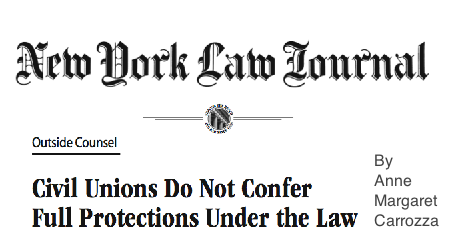The Defense of Marriage Act (DOMA)1 appears to be headed toward the scrap heap of obsolete legislation. President Barack Obama recently directed the Justice Department to cease defending the law in court. President Bill Clinton, who signed DOMA into law in 1996, changed course last week and announced his support for marriage equality. This week, an immigration judge in Newark postponed the scheduled deportation of a Venezuelan man married to an American man, in order to give the Attorney General and an appeals court time to sort out the immigration status of same-sex spouses. All indications are that DOMA is destined to join ‘separate but equal’ as an embarrassing footnote in our history of jurisprudence. When this happens, same-sex marriage laws will be determined and given effect at the state level. It is with this backdrop that the New York Legislature readies to once again take up the issue. Opponents of marriage equality are giving voice to many familiar arguments. One such objection is that domestic partnerships, civil unions and good estate planning can confer all of the legal benefits of marriage to same-sex couples. A review of the Internal Revenue Code, the Social Security Act and other federal statues indicates otherwise.
Rights and Benefits:
There are no fewer than 1,138 federal rights, privileges and benefits in which one’s marital status is a factor.
There are no fewer than 1,138 federal rights, privileges and benefits in which one’s marital status is a factor.2 The definition of spouse is, in turn, determined by each state. Therefore, in order to be able to lay claim to any number of federal benefits and tax breaks, an individual must be legally married according to his or her state of residence. One very significant tax benefit that only applies to married couples is the “Unlimited Marital Deduction.”3 This protects a surviving spouse from having to pay estate taxes upon the death of the first spouse. The rationale behind this deduction is that a husband and wife function as an economic unit.4 The “unit” is taxed upon the death of the surviving spouse. Prior to the enactment of the current 100 percent or “unlimited” marital deduction,5 widows and widowers faced the prospect of having to liquidate assets and/or small businesses in order to pay estate taxes upon the first death. The after-tax assets passing to the spouse were then potentially subject to a second round of estate taxation in his or her estate. The enlightened effect of the unlimited marital deduction is that surviving spouses no longer need to liquidate businesses and/or mortgage property in order to pay taxes upon the first death. That is—unless the survivor happens to be in a same-sex relationship in one of the 45 states that have not yet enacted marriage equality legislation. Similarly, one’s eligibility for Social Security survivorship benefits depends on marital status. The Social Security Act clearly defines husband and wife by reference to the laws of the state in which the applicant resides. Thus, in order to receive survivorship benefits from the program into which one or both parties likely contributed for decades, they must be legally married in their home state. Without access to Social Security survivorship benefits, an elderly person will be more likely to live in poverty. Couples who are not legally married are likewise unable to benefit from Medicaid’s Spousal Impoverishment Protection Law. This law is designed to protect a “well” spouse from impoverishment if his or her spouse needs nursing home care. In 2011, a New York state resident can give up to $109,560 to his or her spouse and thereby save those assets from the long-term care vortex. This law is designed to protect the elderly from being destitute. It is, unfortunately, not available to domestic partners.
Spreading the WordPolls show that the public is very supportive of equal rights for gay couples. It is therefore incumbent on supporters of marriage equality to do a better job of educating the public on the many rights that only marriage can confer.
1. The Defense of Marriage Act is a 1996 law that bars Federal recognition of same-sex marriage.
2. Memo to Congress, General Accounting Office, Jan. 23, 2004.
3. I.R.C. §2056.
4. Estate of Shelfer v. Comm’r, 86 F.3d 1045, 1049 (11th Cir. 1996) (citing S. REP. NO. 97-144, at 127
(1981), reprinted in 1981 U.S.C.C.A.N. 105, 228). Federal income taxation, as a parallel to wealth transfer taxation, treats married couples as economic units by allowing joint filing.
5. I.R.C. §2056
Ann Margaret Carrozza is a practicing elder law and estate planning attorney with offices in Bayside, Glen Cove and Port Jefferson. She has served as a New York State Assemblywoman.
By Ann Margaret Carrozza
WednesdAy, June 1, 2011 www. NYLJ.com


